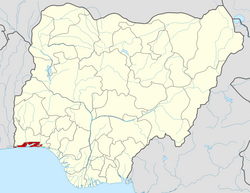Lagos territory
| Lagos Colony | |||||
|
|||||
| Capital | Lagos | ||||
| Government | British Colony | ||||
| History | |||||
| • | Established | 5 March 1862 | |||
| • | Disestablished | February 1906 | |||
Lagos Colony was a British colonial possession centred on the port of Lagos in what is now southern Nigeria. Lagos was annexed on 6 August 1861 under the threat of force by Commander Beddingfield of HMS Prometheus who was accompanied by the Acting British Consul, William McCoskry. Oba Dosunmu of Lagos (spelled "Docemo" in British documents) resisted the cession for 11 days while facing the threat of violence on Lagos and its people, but capitulated and signed the Lagos Treaty of Cession. Lagos was declared a colony on 5 March 1862. By 1872 Lagos was a cosmopolitan trading center with a population over 60,000. In the aftermath of prolonged wars between the mainland Yoruba states, the colony established a protectorate over most of Yorubaland between 1890 and 1897. The colony and protectorate were incorporated into Southern Nigeria in February 1906, and Lagos became the capital of the protectorate of Nigeria in January 1914. Since then, Lagos has grown to become the largest city in West Africa, with an estimated metropolitan population of over 9,000,000 as of 2011.
Lagos was originally a fishing community on the north of Lagos Island, which lies in Lagos Lagoon, a large protected harbour on the Atlantic coast of Africa in the Gulf of Guinea west of the Niger River delta. The Lagoon is protected from the ocean by long sand spits that run east and west for up to 100 kilometres (62 mi) in both directions. Lagos has a tropical savanna climate with two rainy seasons. The heaviest rains fall from April to July and there is a weaker rainy season in October and November. Total annual rainfall is 1,900 millimetres (75 in). Average temperatures range from 25 °C (77 °F) in July to 29 °C (84 °F) in March.
...
Wikipedia


